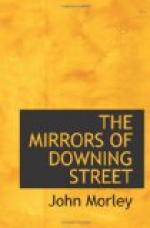Lord Kitchener knew many of his own failings. He was by no means a vain man. Indeed he suffered considerable pain from the knowledge that he was not the tremendous person of the popular imagination. This knowledge robbed him of self-assurance. He tried to live up to the legendary Kitchener, and so long as he could find men as brave as himself, but of swifter and more adaptable intelligence, to do his bidding, he succeeded: many of the public, indeed, believed in the legendary Kitchener up to the day of his tragic death—death, that unmistakable reality, meeting him on a journey, the object of which was to impress Russia with the legendary Kitchener. But more and more, particularly in consultation with the quick wits of politicians, he found it impossible to impersonate his reputation.
I have been told by more than one Cabinet Minister that it was impressive to see how the lightning intellects of Mr. Lloyd George and Mr. Winston Churchill again and again reduced the gigantic soldier to a stupefied and sulking silence.
A proposal would be made by a minister, and Mr. Asquith would turn to Lord Kitchener for his opinion. Lord Kitchener would say, “It’s impossible,” and close his lips firmly. At this Mr. Lloyd George would attack him, pointing out the reasonableness of this proposal in swift and persuasive phrases. Lord Kitchener, shifting on his chair, would repeat, “It’s impossible.” Then in question after question Mr. Churchill would ask why it was impossible. “It’s impossible,” Lord Kitchener would mumble at the end of these questions. Finally, when nearly everybody had attempted to extract from him the reason for his refusal to countenance this proposal, he would make an impatient side movement of his head, unfold his arms, bend over the papers on the table before him, and grunt out, sometimes with a boyish smile of relief, “Oh, all right, have it your own way.”
He lacked almost every grace of the spirit. There was nothing amiable in his character. Very few men liked him a great deal, and none I should say loved him. I do not think he was brutal by nature, although his nature was not refined; but he cultivated a brutal manner. He had the happiness of three or four friendships with cultivated and good women, but the beautiful creature whom he loved hungrily and doggedly, and to whom he proposed several times, could never bring herself to marry him. I think there was no holy of holies in his character, no sanctuaries for the finer intimacies of human life. As Sainte-Beuve said of Rousseau, “he has at times a little goitre in his voice.” One sees the fulness of his limitations by comparing him with such great figures of Indian history as the Lawrences and Nicholson: in that comparison he shrinks at once to the dimensions of a colour-sergeant.
But in attempting to study a man of this nature, for our own learning, we should rather observe how notable a victory he achieved in making so much of so little than vociferate that he was not this thing or that.




